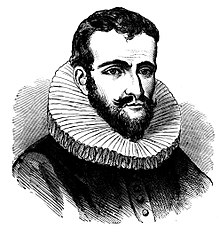Henry Hudson
Henry Hudson (* around 1565, † around 1611 ) was an English navigator who became famous through four voyages of discovery.
Life
Little is known of Hudson's early years. The probable time of his birth is given as “around 1565” or “in the 1560s”, according to other sources “around 1570”.
In 1607 he undertook his first expedition on behalf of the English trading company Muscovy Company . With a single ship ( Hopewell ) Hudson came to the coast of Greenland and Spitzbergen (Svalbard) and discovered the island of Jan Mayen while trying to find a northwest passage from the Arctic Ocean to China. The extent of the intervening land mass was not known.
In the following year he also tried unsuccessfully to find a northeast passage via Novaya Zemlya in the Barents Sea , which although there is, could not be traveled at the time.
In service with the Dutch United East India Company , he set sail from the Dutch island of Texel in 1609 with the ship Halve Maen ( half moon ) on his third voyage. Hudson resumed exploration of the waters off Novaya Zemlya and sought a passage through the ice, against which the crew rebelled. So they sailed west, then south past Nova Scotia and along the North American coast. On September 11, 1609, Hudson penetrated the Bay of New York , sailed along the island of Manhattan (already sighted by Giovanni da Verrazzano in 1524 ) and used the following month to explore the Hudson River as far as the area of today's city of Albany , around 240 Kilometers north of today's city of New York.

In 1610, Hudson set sail on his last voyage on behalf of a newly formed company of English businessmen. With his ship Discovery he was looking for a Northwest Passage again. He reached Hudson Strait in the middle of the year and entered Hudson Bay on August 2nd , where he found an ideal natural harbor. Here he spent the next three months exploring the eastern islands and coasts. Assuming he was in the Pacific, he sailed south to James Bay . In November, his ship was stuck in the ice. A winter of extreme hardship and cold led to a quarrel among the occupants.
In 1611 food ran out on the way back and the crew mutinied. Hudson wanted to make further inquiries along the coast, maybe to find a Northwest Passage after all. Parts of his crew, however, wanted to go home as quickly as possible. Hudson, his son and seven other crew members were abandoned in a small boat at dawn on June 23, 1611 and remained missing afterwards.
Only eight of the mutineers survived the hardships return trip to Ireland. There they were charged, but not convicted, of mutiny. A court found that abandoning experienced seafarers in an open boat near islands that appeared to be inhabited was not murder. It can be assumed that the Admiralty was more interested in the information from the seafarers than in their conviction.
memory
The following are named after him:
- the Hudson River , a river in eastern New York state
- the Hudson Strait , a strait in Canada between the Ungava Peninsula and Baffin Island , which the Hudson Bay leads
- the Hudson Bay , a large bay in the Canadian North America
- the Hudson County , New Jersey
- the Henry Hudson Bridge , a toll bridge in New York City that the district Bronx with the northern end of Manhattan connects
- the city of Hudson, New York , north of New York City
- Hudson Land , an area in East Greenland
- the Hudson Valley , a valley area on the Hudson River
literature
- George Michael Asher (Ed.): Henry Hudson the Navigator: The Original Documents in which his Career is Recorded. Cambridge University Press, Cambridge 2010, ISBN 978-1-108-01048-1 .
- Douglas Hunter: Half Moon: Henry Hudson and the Voyage That Redrew the Map of the New World . Bloomsbury Press, New York 2009.
- Peter C. Mancall: Fatal Journey: The Final Expedition of Henry Hudson - A Tale of Mutiny and Murder in the Arctic . Basic Books, New York 2009.
- Hudson, Henry . In: Encyclopædia Britannica . 11th edition. tape 13 : Harmony - Hurstmonceaux . London 1910, p. 849 (English, full text [ Wikisource ]).
Web links
Individual evidence
- ↑ biographi.ca Hudson, Henry, English navigator and discoverer, and, in a sense, a founding father of both New York City and the Hudson's Bay Company
| personal data | |
|---|---|
| SURNAME | Hudson, Henry |
| BRIEF DESCRIPTION | English navigator |
| DATE OF BIRTH | around 1565 |
| DATE OF DEATH | around 1611 |
